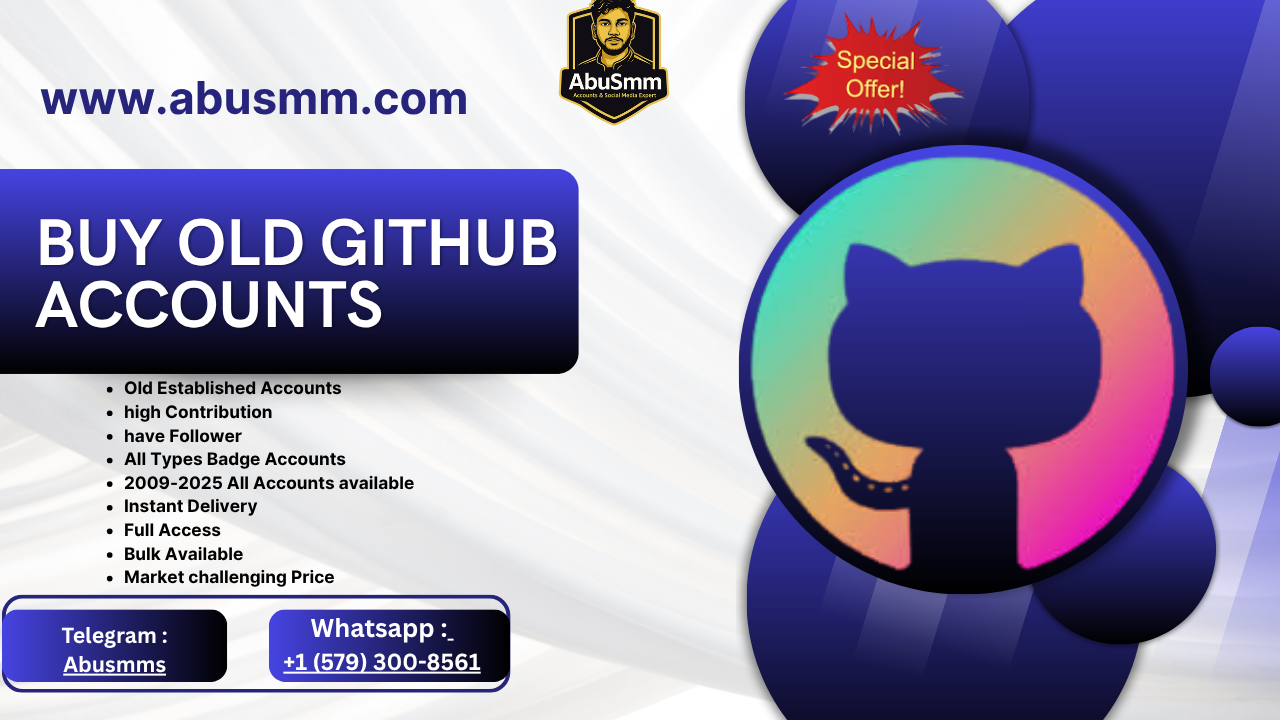4.0 The Best Way to Buy GitHub Accounts in 2026
As we move into 2026, the demand for GitHub accounts continues to grow, particularly among developers, businesses, and professionals seeking to enhance their online presence. The best way to buy a GitHub account involves understanding the platform's policies, ensuring security,
and selecting trusted providers.
It's crucial to avoid unreliable third-party sellers, as these can pose risks such as compromised data or account suspension. Instead, opt for reputable services that offer verified accounts with a history of positive feedback. Researching the vendor’s reputation and ensuring that the accounts are genuine and comply with GitHub's terms of service is essential. Furthermore, buying GitHub accounts through legitimate channels ensures better long-term value, with access to premium features and a seamless experience. Always prioritize security by choosing services that provide reliable customer support and transparent processes.
Why Should I Buy Old GitHub Accounts?
Purchasing an aged GitHub account can offer significant
advantages for developers, startups, and digital professionals aiming to establish credibility swiftly. Older accounts often come with a history of contributions, repositories, and followers, which can enhance trustworthiness and visibility in the developer community.
Telegram : Abusmms
Whatsapp : +1 (579) 300-8561
Email : [email protected]
Facebook Page : Abusmm
Signal : +1 (682) 474-9468
This can be particularly beneficial for freelancers or businesses looking to showcase their expertise
without waiting for a new account to gain recognition.
However, it's crucial to approach such purchases with caution. GitHub's terms of service generally prohibit buying or selling accounts, and engaging in such transactions may lead to account suspension or other penalties. To mitigate risks, consider acquiring accounts through reputable platforms that offer buyer protection and verify the legitimacy of the accounts. Always ensure that the account's history aligns with your objectives and that it complies with GitHub's policies.
In summary, while buying an old GitHub account can provide immediate benefits like enhanced credibility and faster integration into the developer community, it's essential to weigh these advantages against the potential risks. Proceeding with due diligence and caution can help you make an informed decision that aligns with your professional goals.
How to Recover an Old GitHub Account?
Recovering an old GitHub account can be a straightforward process if you follow the right steps. First, ensure that you have access to the email address associated with the account. If you’ve forgotten your password, GitHub’s password recovery page allows you to reset it by entering your email. After submitting your email, check your inbox for a recovery link. If the email is no longer valid or you’ve lost access to it, GitHub provides an account recovery form where you can verify your identity. Make sure to provide any relevant details such as the account’s username, repository names, or previous email addresses.
In some cases, if the account is linked to a third-party service like Google or Facebook, you may be able to use those credentials to regain access. If all else fails, GitHub’s support team can assist further, but you may need to prove ownership of the account by providing details of recent activity or other identifying information. Always remember to update your contact information once you’ve regained access to prevent future issues.
Telegram : Abusmms
Whatsapp : +1 (579) 300-8561
Email : [email protected]
Facebook Page : Abusmm
Signal : +1 (682) 474-9468
What Happens if You Delete a GitHub Account?
Deleting your GitHub account is a significant decision that leads to the permanent loss of all associated data. This includes repositories, private forks, wikis, issues, pull requests, and GitHub Pages sites. Once deleted, GitHub cannot restore this content.
Additionally, your username becomes available for reuse by others after 90 days, and your email address can be reassigned to a different account immediately. If you're the sole owner of any organizations, you must transfer ownership or delete the organization before proceeding with account deletion. It's crucial to back up all necessary data before initiating this process.
Can You Restore a GitHub Repository?
Yes, it is possible to restore a GitHub repository, and the process depends on the situation you're facing. If you've accidentally deleted a repository, GitHub doesn’t offer a direct recovery option. However, you can restore it using a backup, if available, or by contacting GitHub support. In cases where you have local copies of the repository or its branches, you can push the content back to GitHub, effectively restoring the repository. Another option is to check for any forks or clones made by collaborators, as they might contain a copy of the repository that you can use to recreate it.
Additionally, if the repository was deleted but not overwritten, you may find that GitHub’s support team could assist in retrieving the repository, as long as it's within the retention period. Regularly backing up your GitHub repositories, either through third-party services or by cloning them locally, is always a good practice to avoid these situations in the future.
It's important to act quickly when dealing with a deleted repository, as some recovery options may be limited depending on the time passed and the available backups.
Does NASA Use GitHub?
NASA indeed uses GitHub, the widely known platform for version control and collaborative software development. The space agency actively shares a variety of projects on GitHub, ranging from open-source software for scientific research to tools for space missions. These repositories enable both NASA engineers and the global community to collaborate, contribute, and access valuable resources.
NASA's use of GitHub fosters transparency and encourages the sharing of knowledge across a diverse range of scientific fields. By making its code publicly available, NASA not only advances space exploration but also helps create software solutions that benefit the broader tech community. With GitHub, the agency has opened new avenues for innovation and collaboration on a global scale.
How Do I Find Out What Email I Used for GitHub?
If you're unsure about the email address associated with your GitHub account, there are a few ways to check. First, try logging into GitHub and navigating to your account settings. Once you're there, look for the "Emails" section under the "Account" tab. This will display the email addresses linked to your account. If you're using GitHub Desktop or Git locally, you can also check your Git configuration by running in your terminal or command prompt. This will show you the email tied to your local Git repositories.
Telegram : Abusmms
Whatsapp : +1 (579) 300-8561
Email : [email protected]
Facebook Page : Abusmm
Signal : +1 (682) 474-9468
If you're still having trouble, check your email inbox for GitHub notifications or confirmation emails that might reveal the email you used when creating your account. In some cases, if you've forgotten your login credentials, GitHub's password recovery process can also help you identify the email address linked to your account.
Can I Change the Email Associated with My GitHub Account?
Yes, you can change the email associated with your GitHub account. To do so, navigate to your GitHub profile settings, click on "Emails" in the sidebar, and under "Add email address," enter your new email.
GitHub will send a verification email to that address; click the link in the email to verify it. Once verified, you can set this new email as your primary by selecting it from the "Primary email address" dropdown and clicking "Save." If you wish to remove your old email, ensure it's not set as primary, then click the "Remove" button next to it. Additionally, if you're using Git locally, update your commit email by running the command:
What Email to Use with GitHub?
When setting up a GitHub account, it’s important to choose an email address that aligns with your purpose on the platform. For personal projects, many users opt for their primary email to stay connected with notifications and updates. However, using a separate, dedicated email for GitHub can offer more privacy and organization, especially if you plan to contribute to multiple open-source projects. It’s also recommended to use an email linked to a professional domain if you are representing a company or working on a team project.
Additionally, consider enabling GitHub’s email privacy features. This ensures that your commits show a private email address, protecting your personal contact information. You can link different email addresses to your GitHub account, giving you the flexibility to manage different projects while keeping communication streamlined and secure. Always keep in mind that the email address you use with GitHub will also be used for notifications, password resets, and other account-related updates, so choose wisely.
Can You Make a GitHub Account Without an Email?
Creating a GitHub account typically requires an email address as part of the sign-up process. The email serves as a way to verify your identity, recover your account if needed, and receive important notifications regarding your repositories and contributions. While some may wonder if it's possible to create an account without providing an email, it is highly unlikely as GitHub emphasizes the importance of having a verified email for account security and communication.
However, GitHub allows you to keep your email address private, and you can choose to use an email address that isn't linked to your personal identity. This is useful for maintaining privacy while still adhering to their registration requirements. Additionally, if you're concerned about privacy, GitHub provides features such as using a GitHub-provided no-reply email for commits. Therefore, while you can control how visible your email is, an email is still required for account creation on the platform.
Telegram : Abusmms
Whatsapp : +1 (579) 300-8561
Email : [email protected]
Facebook Page : Abusmm
Signal : +1 (682) 474-9468






Discussion (0)